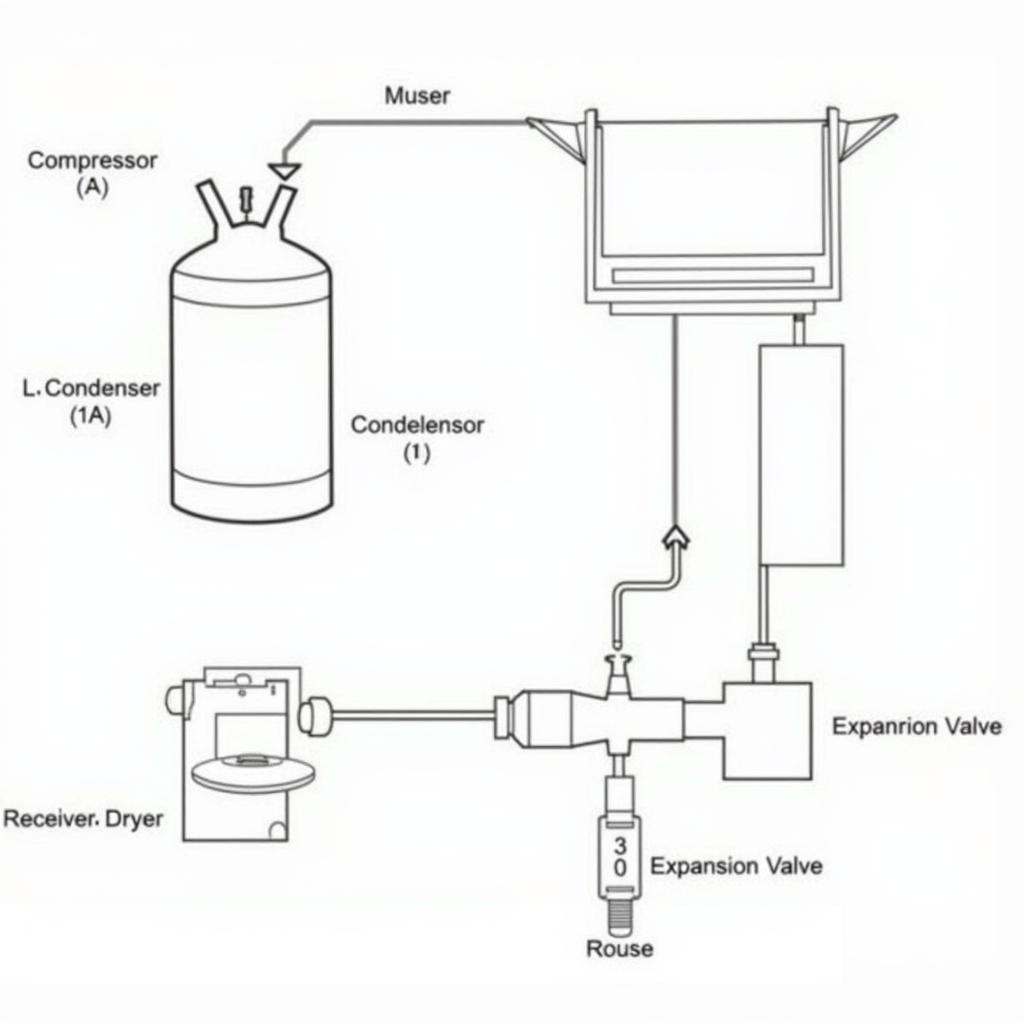A properly functioning car air conditioner is essential for a comfortable driving experience, especially during hot summer months. A leak in your car’s AC system can lead to poor cooling performance and even complete system failure. If you suspect your car AC has a leak, this guide will provide a comprehensive overview of the problem, how to diagnose it, and potential solutions.
One of the first signs of a car air conditioner leak is reduced cooling efficiency. You might notice that the air coming out of the vents is not as cold as it used to be, even when the AC is set to the highest setting. how to fix air conditioner leaking water inside car explores the common issue of water leaking inside the car due to a clogged AC drain tube. This is just one example of how a seemingly small leak can lead to larger problems if left unaddressed.
Common Causes of Car AC Leaks
Before diving into solutions, it’s crucial to understand the common culprits behind these leaks:
- O-rings and seals: These rubber components are prone to drying out, cracking, and shrinking over time, leading to refrigerant leaks.
- Hoses and connections: Vibrations and constant pressure can cause hoses to wear down or connections to loosen, resulting in leaks.
- Compressor: The heart of the AC system, the compressor, can develop leaks through its seals or connections.
- Evaporator: Located inside the dashboard, the evaporator can develop leaks that are difficult to detect and repair.
- Condenser: Positioned at the front of the vehicle, the condenser is vulnerable to damage from road debris, potentially causing leaks.
 Car AC Components Diagram
Car AC Components Diagram
Diagnosing a Car Air Conditioner Leak
Pinpointing the source of the leak is the first step to fixing it. Here’s how you can diagnose the issue:
- Visual Inspection: Carefully examine all visible AC components, including hoses, connections, and the compressor, for signs of oil residue, which often indicates a refrigerant leak.
- UV Dye Test: A specialized UV dye can be added to the AC system. When the system is running, a UV light can reveal the leak’s location.
- Electronic Leak Detector: These devices are highly sensitive to refrigerant and can detect even the smallest leaks.
- Pressure Test: A professional mechanic can use a pressure gauge to test the system for leaks and determine the severity.
How to Fix a Leak in Car Air Conditioner
The repair method depends on the leak’s location and severity. Here are some common solutions:
- Replacing O-rings and Seals: This is a relatively simple and inexpensive repair that can often be done at home with basic tools.
- Tightening Connections: Loose connections can often be tightened with a wrench. However, it is important to be careful not to overtighten.
- Repairing or Replacing Hoses: Damaged hoses need to be replaced entirely.
- Repairing or Replacing the Compressor: Compressor repairs are complex and typically require a professional mechanic.
- Repairing or Replacing the Evaporator or Condenser: Similar to compressor repairs, these are complex procedures best left to professionals.
fix leaky air conditioner car provides additional guidance on how to approach the repair process, including precautions and essential tools needed for a successful fix.
 Mechanic Using UV Light to Detect AC Leak
Mechanic Using UV Light to Detect AC Leak
Preventing Future Leaks
While some wear and tear are inevitable, proactive maintenance can prevent many AC leaks:
- Regular Inspections: Have your car’s AC system inspected annually by a qualified mechanic.
- Timely Repairs: Address any AC issues, such as weak airflow or unusual noises, promptly to prevent further damage and leaks.
- Keep the System Clean: Regularly clean the condenser and surrounding areas of debris to prevent damage and potential leaks.
DIY vs. Professional Repair
While minor repairs like replacing O-rings might be manageable for DIY enthusiasts, it’s crucial to recognize your limitations. AC systems are complex, and improper handling of refrigerant can be dangerous and harmful to the environment. If you’re unsure about a repair or if it involves refrigerant, it’s always best to consult a qualified mechanic.
how to fix a leaking air conditioner car offers a deeper dive into DIY repair options, helping you assess the complexity of your situation and determine the best course of action.
Conclusion
A leaking car air conditioner can be a frustrating experience, but understanding the causes, knowing how to diagnose the issue, and being aware of the repair options can help you get your AC back in working order. Regular maintenance and prompt repairs are key to preventing future leaks and ensuring a comfortable driving experience all year round.
If you’re experiencing issues with your car’s AC system and need professional assistance, feel free to contact AutoTipPro at +1 (641) 206-8880. Our team of expert mechanics is dedicated to providing top-notch car repair and maintenance services. You can find us at 500 N St Mary’s St, San Antonio, TX 78205, United States.
FAQs
1. How much does it cost to fix a car air conditioner leak?
The cost of repair depends on the leak’s location and severity. Simple repairs like O-ring replacements can cost under $100, while major repairs like compressor replacements can range from $500 to $1500 or more.
2. Can I drive my car with a leaking AC?
While you can technically drive with a leaking AC, it’s not recommended. The leaking refrigerant can damage other components, and the system’s efficiency will continue to decline, potentially leading to complete system failure.
3. How often should I recharge my car’s AC?
A well-maintained car AC system should not require frequent recharging. If your AC needs recharging every year, it likely has a leak that needs to be addressed.
4. Can I add refrigerant to my car’s AC myself?
While DIY refrigerant recharge kits are available, it’s generally not recommended unless you have the proper knowledge and equipment. Improper handling of refrigerant can be dangerous and illegal.
5. How can I tell if my car needs a new AC compressor?
Signs of a failing compressor include loud noises from the engine bay when the AC is on, reduced cooling performance, and a burning smell.





Leave a Reply